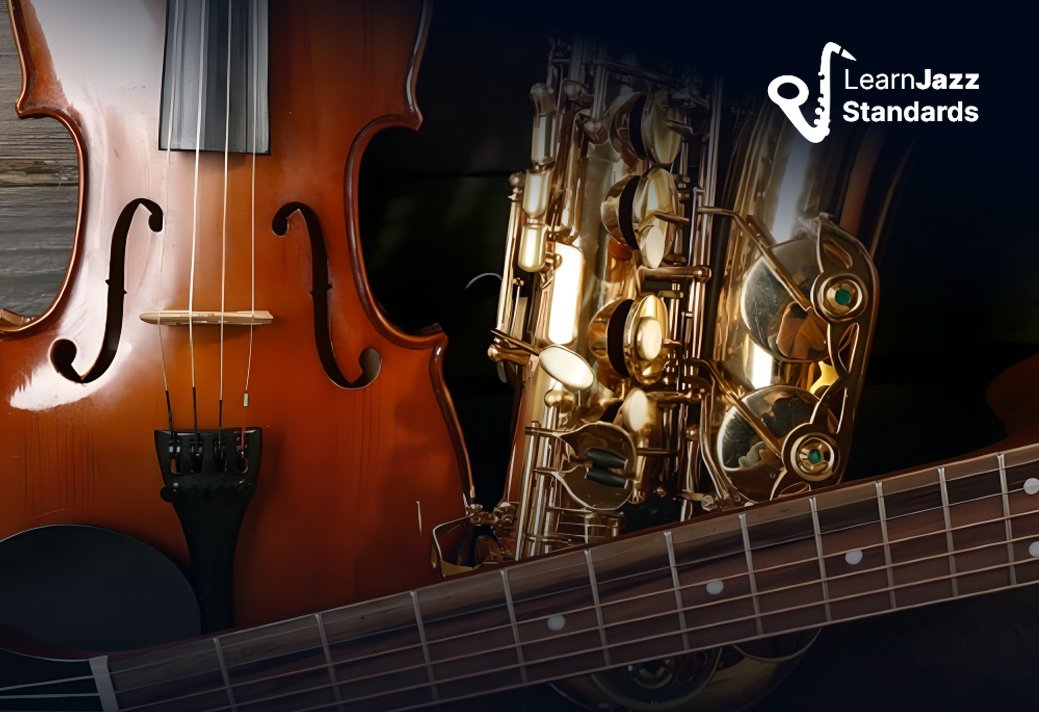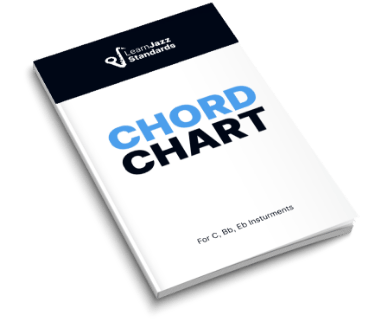If you want to improve your jazz soloing and incorporate the altered sound into your playing, you’ll need to learn how to use the altered scale! The altered scale works well over certain dominant chords, but it doesn’t work over others.
Do you know why?
Understanding the music theory behind why the altered scale works will help you become a stronger, more knowledgeable musician. But, more importantly, you’ll learn when not to use it over certain chords. There are other scales you can use to get certain sounds.
In this article, we’ll analyze the altered scale and other altered-sounding scales you can use over an altered dominant chord. By the end of this article, you’ll better grasp altered harmony and know some tricks to bring out the altered sound in your jazz improvisation!
If you struggle to improve as a jazz player and need help busting through practice plateaus, you should check out the Learn Jazz Standards Inner Circle.
The Inner Circle contains a treasure trove of incredible jazz education resources designed to help you overhaul poor practicing methods and reach your jazz playing goals. Plus, with a thriving community of other musicians, you’ll have all the support and motivation to stick with it and accel!
Check out what the Inner Circle has to offer!
Table of Contents
When The Mixolydian Scale Isn’t Enough
When first learning to improvise, jazz students connect diatonic chords with the appropriate scales that fit overtop. This is technically correct (but otherwise very vanilla) improvisation. Let’s explore that process before getting more advanced.
C Major Scale:
For example, the major scale has seven notes in it. You can build seven diatonic chords from these seven notes, each with its own corresponding scale (or mode).

You can build diatonic triads or diatonic seventh chords by taking the major scale and stacking thirds on each note in the scale. When you do this for C, you’ll get a Cmaj7 chord:
- C-D-E-F-G-A-B-C
- 1-2-3-4-5-6-7-1
C Major Chord Scale With Diatonic Chords and Corresponding Modes:

When beginner jazz students encounter chords in a chord progression, they’ll relate the chords in any given key with the modes of the major scale that represent those particular chords.
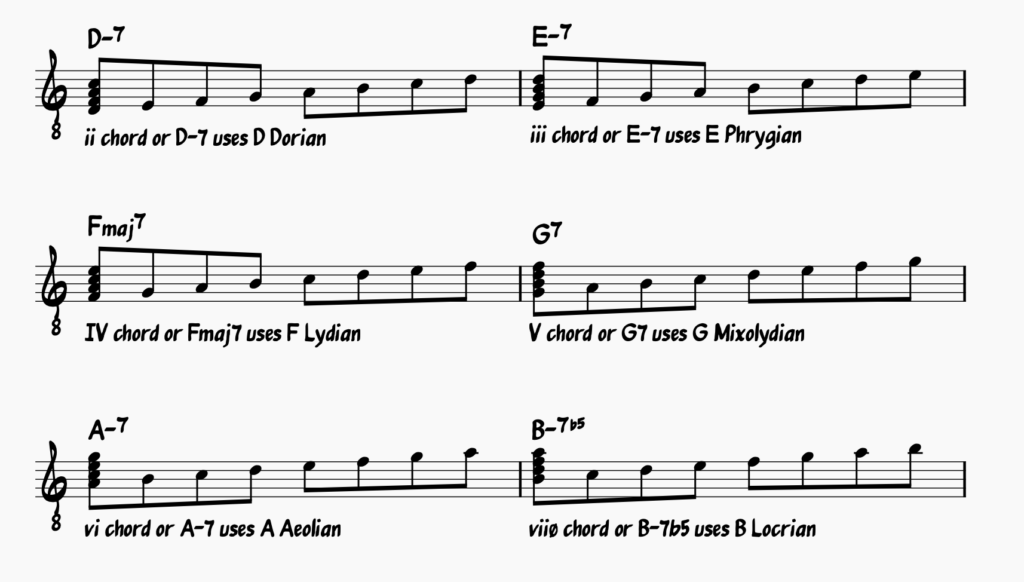
For example, when practicing over a I-vi-ii-V chord progression, a jazz player can take the corresponding modes of each chord and plug them in where appropriate.

This is all technically correct. However, these modes don’t contain many of the altered sounds and rich harmonies that make jazz improvisation unique. This is especially true for dominant chords, where seasoned jazz players can impose various altered harmonies over the dominant sound.
In such cases, the Mixolydian or Dominant Bebop scale isn’t enough to hit the altered tones commonly found in jazz. In most jazz tunes, the composer specifically implied certain altered tones that an improviser needs to be familiar with.
You won’t be able to create these altered sounds using the modes of the major scale. You’ll need some new improvisational material to hit these altered chord tones.
For a complete refresher on the major scale modes, check out our article on the seven major scale modes.
Introducing the Altered Scale (A.K.A. the Super-Locrian Scale, Altered Dominant Scale, or Diminished Whole Tone Scale)
When improvising over altered dominant chords, jazz musicians often use scale fragments from the altered scale to create tension in their lines and hit altered chord extensions.
The altered scale is also known as the super-Locrian, altered dominant scale, or diminished whole-tone scale. This scale is one of the modes of the melodic minor scale—the 7th mode, to be exact!
The altered scale (or the super-Locrian mode) is built off of the seventh scale degree of the melodic minor scale in the same way the Locrian mode is built off the seventh scale degree of the major scale.
C Melodic Minor Scale Harmonized in 7th Chords:

The 7th mode of the C melodic minor scale is the B super-Locrean mode or the B altered scale.

We can break down the altered scale formula in a few ways to better understand altered scales.
Altered Scale Steps (W = Whole Step; H = Half Step):
- H – W – H – W – W – W – W
Altered Scale Tones in Relation to the Root:
- 1, b9, #9, 3, #11, b13, b7, 1
This means we can play the altered scale over any dominant chord with a b9, #9, #11 (b5), or #5 (b13). In a performance situation, it is probably more beneficial to think of altered scales as their own separate scales rather than doing the mental math of grabbing the 7th mode of a different parent scale.
C7alt chord showing all the altered extensions:
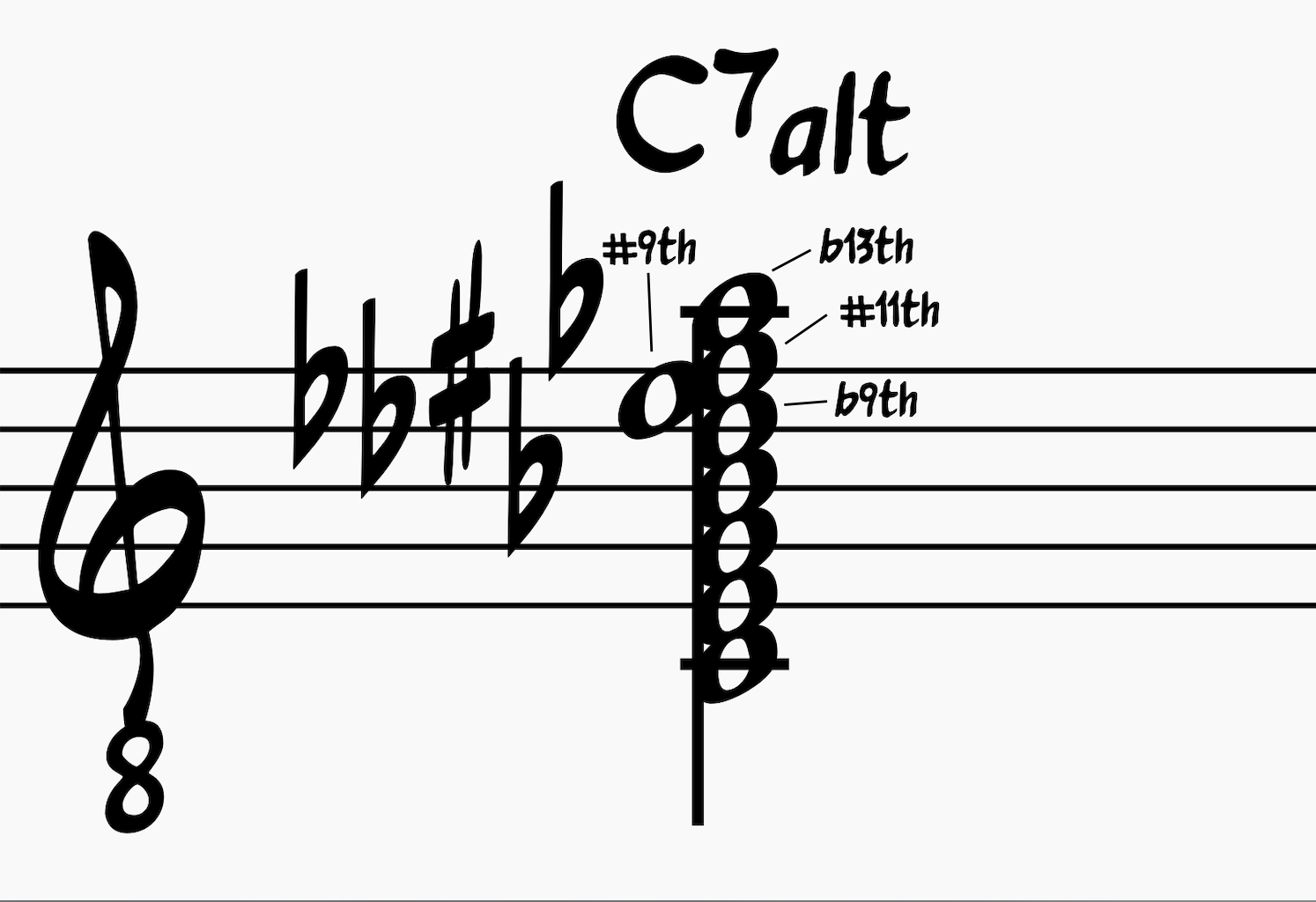
- Chord tones: rt, 3rd, 5th, 7th
- Altered notes: b9, #9, #11 (b5), and #5 (b13)
Now that we know how to build altered scales, let’s explore some altered scales in different keys:
C Altered Scale (Db Melodic Minor):

G Altered Scale (Ab Melodic Minor):

D Altered Scale (Eb Melodic Minor):

Try playing the altered scale in other keys!
For more about the melodic minor scale modes like the Lydian dominant scale or Mixolydian flat 6 scale, check out our post on how to use the melodic minor scale modes in your improvisation.
Other Jazz Scales That Have An Altered Sound
The altered scale hits the b9, #9, #11, and b13, but not every dominant chord will need these alterations. In cases where the chord symbols are very specific, you must also be very specific in your chosen notes.
Let’s look at the diminished scale and the whole tone scale and discuss when each is a better choice over the altered scale.
The Half-Whole Diminished Scale
Altered scales won’t cut it over certain dominant chords. When circumstances are just right, you’ll want to use the diminished scale instead.
The diminished scale is unique in a few ways:
- 1. The diminished scale is symmetrical.
- 2. The diminished scale has eight notes (octatonic).
- 3. The diminished scale only has two modes.
You can think of diminished scales as being made of two diminished chords stacked on top of one another a half step apart. Below, you’ll see a C diminished chord and a Db diminished chord. When we notate these two diminished chords as a scale, we get the diminished scale.

The step formula for a diminished scale is either:
- H-W-H-W-H-W-H-W, or
- W-H-W-H-W-H-W-H
Because of this symmetry, there are only two modes—one which starts on the half step and the other which starts on a whole step:
- The half-whole diminished scale (best over a dominant seventh chord)
- The whole-half diminished scale (best over a diminished chord)
The half-whole diminished scale works best when playing over dominant chords because it contains a minor 7th interval and several altered notes from an altered dominant 7th chord.
C7alt(♮13) chord showing altered extensions and essential tones:
- Chord tones: rt, 3rd, 5th, b7th
- Extensions: ♮13
- Altered Extensions: b9th, #9th, #11th (b5)
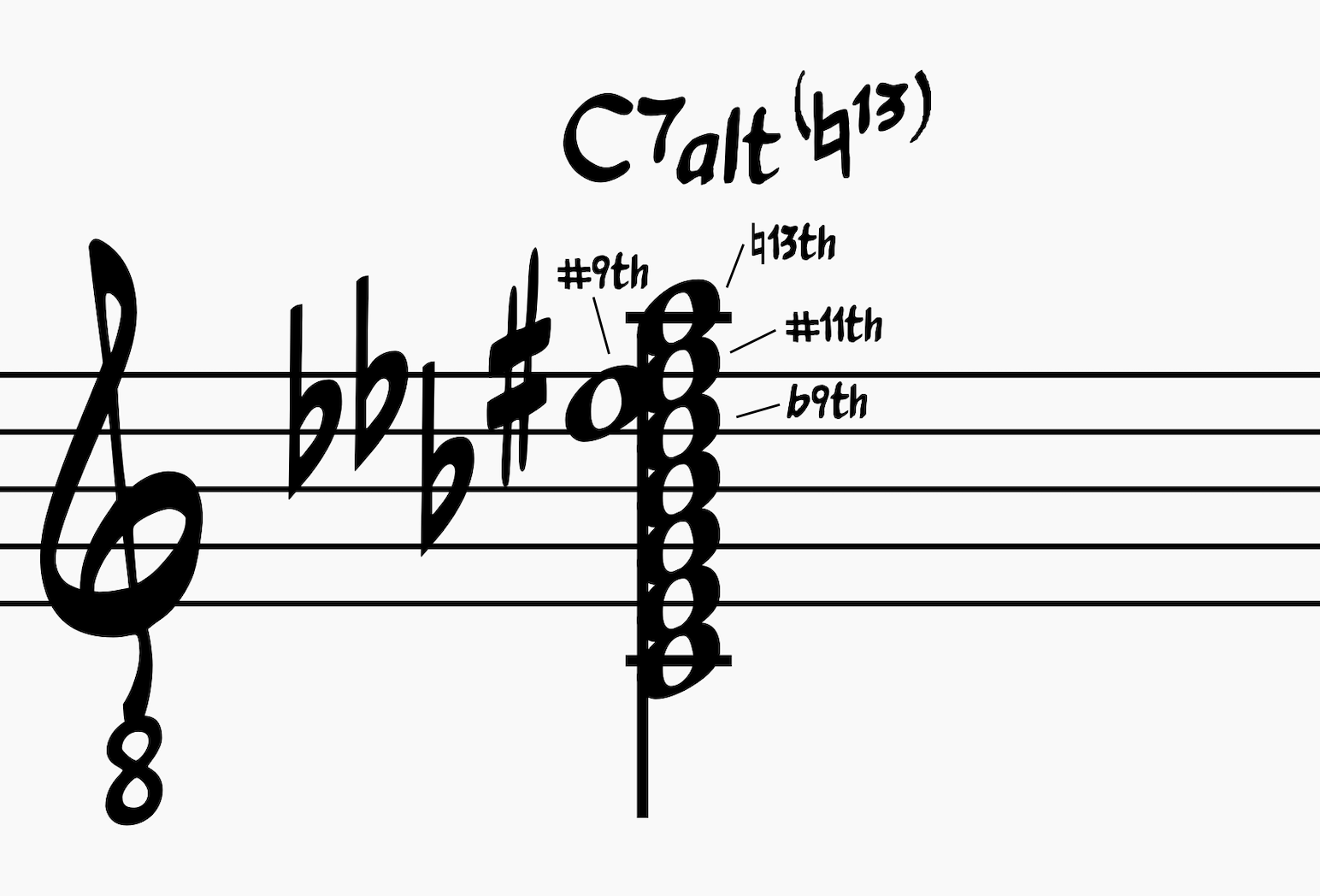
The Only Difference Between the Altered Scale and the Diminished Scale
You can use the altered scale and the half-whole diminished scale over a dominant 7th chord to bring out those altered extensions when you play jazz. However, there is one notable difference you need to be aware of!
- Altered scales have a b13 (b6) interval in them.
- The half-whole diminished scale has a natural 13 (natural 6) in it.
Though the distinction seems subtle, sonically, the difference is great. A dominant seventh chord with a b13 or #5 sounds completely different from dominant chords with a natural 13th. In jazz theory, a V7 chord with a b13 or #5 alteration usually resolves to a minor chord (though not always).
BEFORE YOU CONTINUE...
If you struggle to play amazing jazz solos and want to learn the secret strategies the pros are using to improvise, our free guide will get you on the right track.
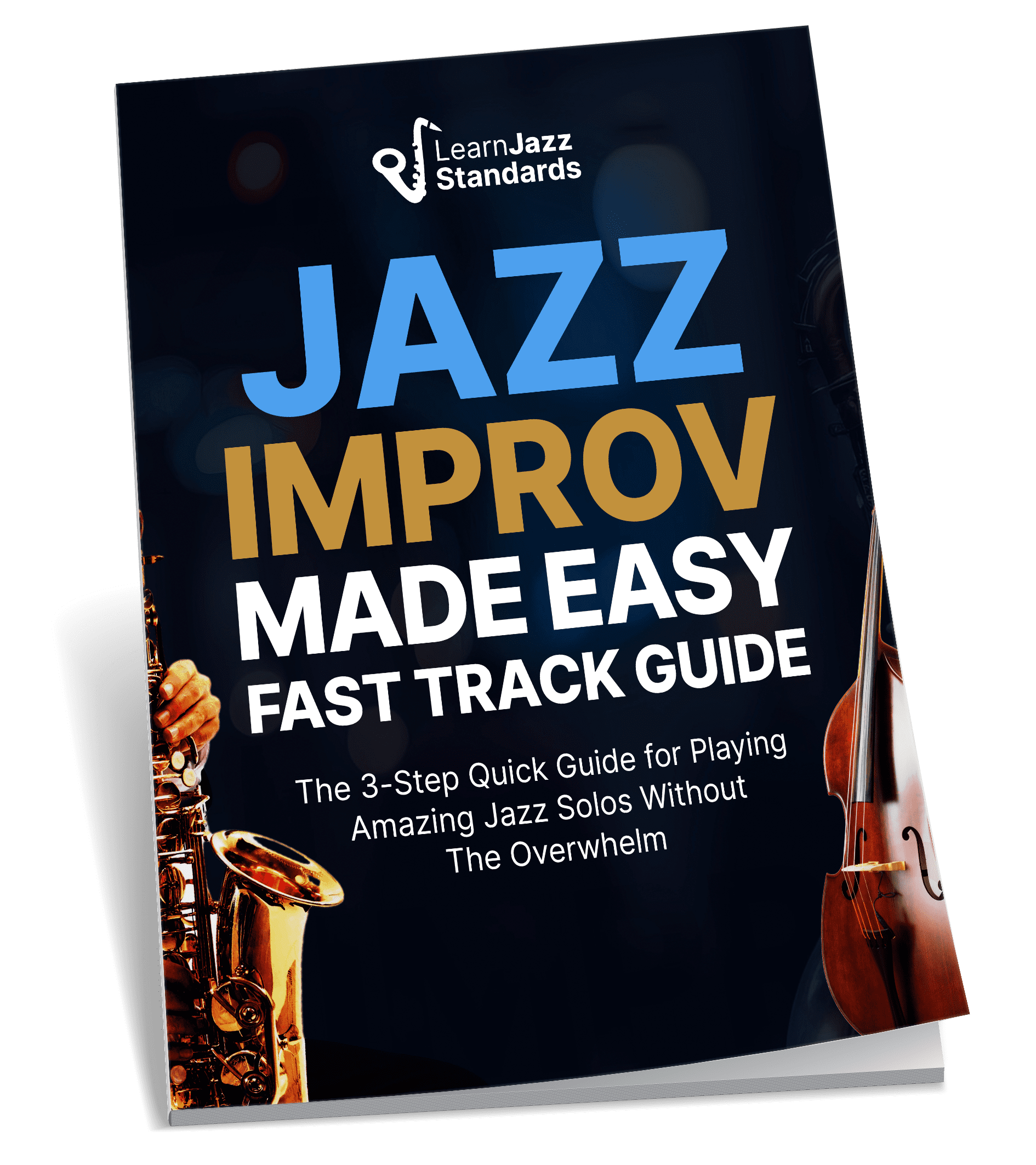
The Whole Tone Scale
You can use the scale when the altered or diminished scales just won’t cut it. Whole-tone scales are similar to diminished scales in that they are symmetrical. However, instead of alternating half steps and whole steps, the whole tone scale is only made of whole steps.
This feature gives the scale a “dream-like” quality. It’s often used in cinema when a character is having a flashback. Only six notes are within the octave, making it a hexatonic scale.
Here is a breakdown of the characteristics:
- 1. Whole tone scales are symmetrical.
- 2. Whole tone scales are made of whole steps.
- 3. They only have six notes.

The scale formula is easy to remember as it’s all whole steps! W-W-W-W-W-W
This scale is useful for any dominant chord voicing with a #11 (b5) or a #5 (b13). Note, this scale doesn’t hit the b9 or the #9! It has a natural 9 in it. This scale won’t work well over chords with b9s or #9s.
You won’t want to use it over standard altered dominant 7th chords or chords that specify a b9 or #9.
For more on jazz scales, check out our article on the 16 most important jazz scales you need to know.
How To Use Altered Notes in Jazz Improvisation
Before digging into this section, we need a little disclaimer:
Scales help you construct melodies, but scales are not melodies in and of themselves! Therefore, when improvising, you aren’t improvising scales; you are improvising melodies!
With that out of the way, let’s do a brief recap on the two scales we’ve discussed
Altered Scale Recap

- The altered scale is the seventh mode of the melodic minor scale. If you play the G altered scale, you are playing Ab melodic minor.
- You can play the altered scale over any dominant chord that has any four altered extensions: b9, #9, #11 (b5), or b13(#5).
Diminished Scale Recap

- Diminished scales are symmetrical, eight-note scales made from two fully diminished chords spaced a half step apart.
- There are two types of diminished scales: the half-whole diminished and the whole half-diminished
- The half-whole diminished is great for playing over dominant chords with altered extensions. The whole-half diminished only works over diminished chords.
Check out this article for more on the diminished scale.
Whole Tone Recap

These scales are symmetrical, six-note scales that are made of whole steps.
Only use these scales on chords that specify a #11 (b5) or #5 (b13). Due to the natural 9, this scale will clash with alt. chords or chords that specify b9s or #9s.
Different Altered Chords You’ll Encounter (When to Use Altered Scales or Something Else)
C13(b9) is the preferred nomenclature for a chord that uses harmony from the half-whole diminished scale. It has a natural 13th (or natural 6th).
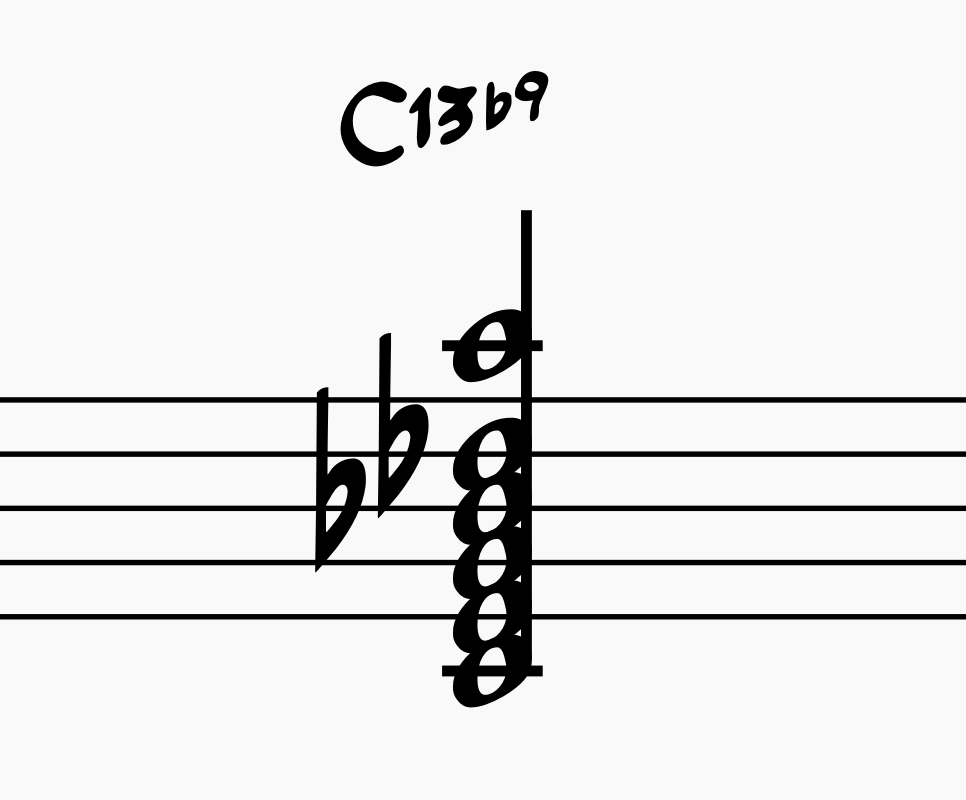
C7alt or C7(#9,b13) is the preferred nomenclature for an altered chord that uses melodic minor harmony or the altered scale.
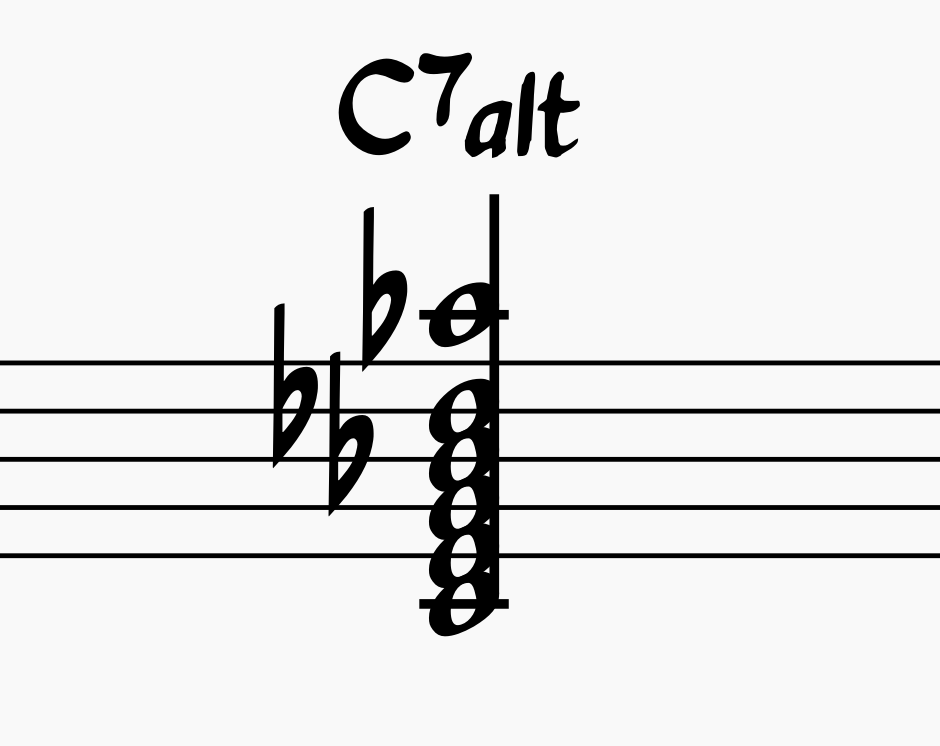
You may see other more descriptive nomenclature, but the more specific you get, the harder it is to read them on the fly! Use C13(b9), C7alt, and C7(#9,b13) if you are notating chords.
So why even bother writing C13(b9,#9,#11) if no one wants to read that? Doing so tells you what notes are in the chord and in the scale! C13(b9) is the shorthand version.
Remember, the altered scale and diminished are made of almost the same notes! The big difference is the 13th! In the altered scale, the 13th is flat. In the half-whole diminished, the 13th is natural.
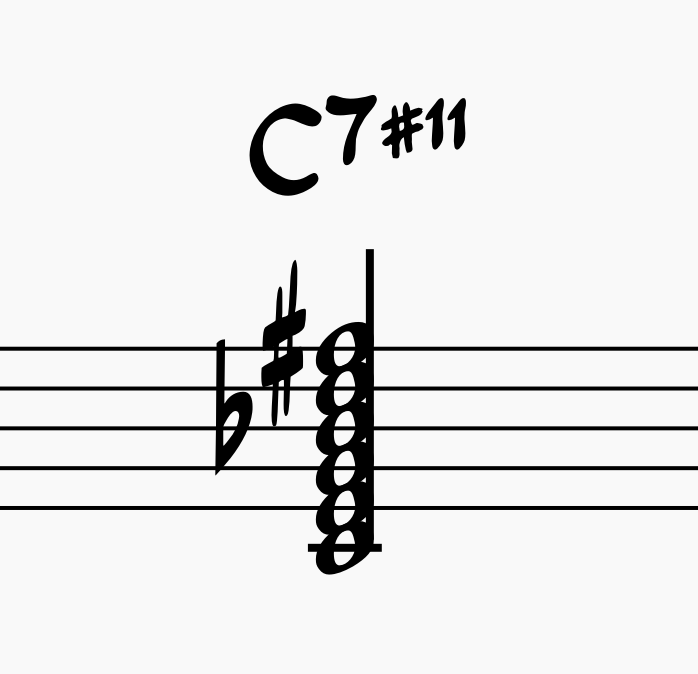
The whole tone sound only works over chords that specify a #11 or #5 with a natural 9. When you see a natural 9, the diminished and altered scale won’t work!
Licks You Can Play Using The Diminished and Altered Scale
Let’s look at some licks you can incorporate into your playing:
Half-Whole Diminished Resolving To A Major Tonic Chord (ii-V-I):

Altered Scale Resolving To A Minor(Maj7) Tonic Chord (ii-V-i):

Whole Tone Resolving to a Major Tonic Chord (ii-V-I):

Be sure to take these licks into different keys!
Check out other licks that use the altered scale and the half-whole diminished scale. Also, here’s a PDF of this lesson’s diminished and altered scale and chords: Altered vs. Diminished Scales.
A Final Word On How To See The Altered Scale
The altered scale is like a hybrid scale combining aspects of diminished and whole-tone sounds. The first half of the altered scale is diminished, while the last half pulls from the whole tone scale.
Need A Jazz Practice Overhaul? Join the Learn Jazz Standards Inner Circle and Take Your Jazz Playing To The Next Level!
Are you struggling to apply jazz theory in your jazz solos? Are you hitting plateaus in your jazz playing and need some sort of breakthrough in your practice routine?
The Inner Circle is designed to help you take your jazz abilities to the next level.
With an abundance of jazz education resources, including masterclasses, workshops, and many courses at your fingertips, you’ll be sure to blast through practice plateaus and reach your jazz playing goals!
Ready to level up? Check out the Inner Circle.



